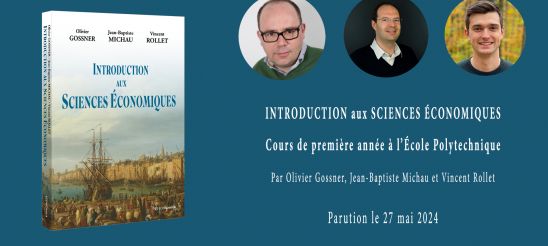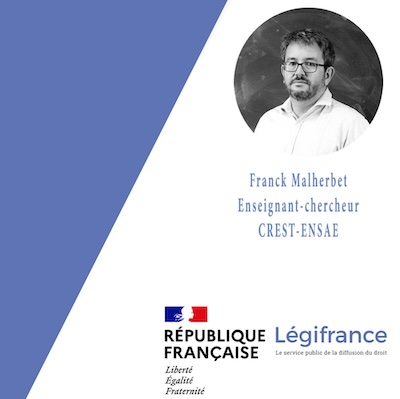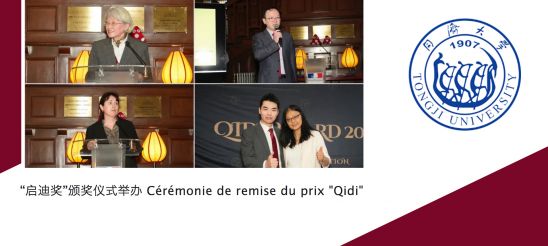Le 3 juin 2024, les éditions Economica ont publié Introduction aux Sciences Economiques, Cours de Première Année à l’Ecole polytechnique, par Olivier Gossner (CREST-CNRS), Jean-Baptiste Michau (CREST-Ecole polytechnique) et Vincent Rollet (doctorant au MIT et ancien étudiant de l’Ecole Polytechnique).
Olivier Gossner est normalien, docteur et titulaire de l’agrégation en mathématiques et de l’habilitation à diriger les recherches en économie. Il est directeur de recherche au CNRS, professeur d’économie à l’École Polytechnique et professeur de mathématiques à la London School of Economics. Ses recherches portent sur la théorie des jeux et sur les asymétries d’information en économie.
Jean-Baptiste Michau est docteur en économie de la London School of Economics et titulaire de l’habilitation à diriger des recherches en économie. Il est professeur d’économie à l’École Polytechnique. Spécialisé en macroéconomie, en finances publiques et en économie du travail, ses recherches portent sur les interactions entre les politiques monétaires et budgétaires.
Vincent Rollet est polytechnicien et doctorant en économie au Massachusetts Institute of Technology. Ses recherches portent sur les enjeux auxquels font face les zones urbaines, ainsi que sur l’impact économique des phénomènes politiques
Nous les avons interrogé sur ce projet :
Pourquoi avoir eu envie de travailler ensemble sur la rédaction d’un manuel ?
Oliver et moi dispensons depuis 6 ans le cours d’introduction aux sciences économiques obligatoire pour tous les élèves ingénieurs en première année à Polytechnique. Le manuel est issu des notes de cours. Vincent Rollet était un de nos élèves les plus prometteurs, aujourd’hui doctorant au MIT. Avant de partir aux Etats-Unis, il a enseigné les Petite Classes (les TD) de ce cours. Ayant de nombreuses idées sur l’enseignement de l’économie à l’X, il nous a semblé naturel de l’associer à ce projet.
Quel est l’apport de chacun dans cet ouvrage ?
On peut vraiment considérer que ce manuel est un travail d’équipe et que l’ensemble a été collectivement écrit par nous trois. Nous avons chacun nos domaines de compétence: Olivier est spécialiste de la microéconomie et de la théorie des jeux, Vincent de l’économie empirique, du commerce international, et de l’économie politique (qui se rapprochent des sciences politiques), et moi-même de l’économie publique et de la macroéconomie. Ceci étant, nous avons croisé nos regards sur chacun des sujets afin d’écrire un manuel cohérent et facilement accessible.
Retrouvez ci-dessous le résumé de leur travail :
Comment réduire les activités néfastes à l’environnement ? Quels sont les effets de la robotisation sur l’emploi ? Quelles sont les conséquences du contrôle des loyers ? Comment allouer les places à l’université entre les élèves qui sortent du lycée ? À quoi sont dues les crises financières ? Quels sont les ressorts de l’inflation ?
Ce manuel présente les concepts fondamentaux de l’analyse économique qui permettent de répondre à ce type de questions. Il s’adresse aux étudiants qui découvrent la discipline, ainsi qu’aux personnes qui souhaitent renforcer leurs acquis élémentaires en sciences économiques.
Il suppose des connaissances en mathématiques du niveau du baccalauréat.
L’ouvrage explique rigoureusement le fonctionnement d’une économie de marché, ainsi que ses défaillances comme la concurrence imparfaite ou les asymétries d’information. Ces principes sont appliqués à l’analyse du marché du travail et des marchés financiers. Les fondements de l’analyse macroéconomique sont présentés à l’échelle nationale, puis internationale. Des chapitres spécifiques proposent des introductions à la théorie des jeux, à la théorie du vote, ou encore aux algorithmes d’appariement entre offre et demande. Les concepts sont illustrés par de nombreux exemples.
CEPR DP19094: “Trouble Every Day: Monetary Policy in an Open Emerging Economy” by Ekaterina Pirozhkova, Giovanni Ricco and Nicola Viegi
22 May 2024
Franck Malherbet nommé membre du groupe d’experts sur le salaire minimum de croissance
Franck Malherbet nommé membre du groupe d’experts sur le salaire minimum de croissance
Podcast : Céline Grislain-Letrémy était l’invitée de l’émission “Les voix de l’économie” sur Radio Classique.
Céline Grislain-Letrémy, est économiste-chercheur senior à la Banque de France et chercheur affilié au Centre de Recherche en Économie et Statistique (CREST).
Émission du lundi 6 mai 2024
Podcast : Céline Grislain-Letrémy était l’invitée de l’émission “Les voix de l’économie” sur Radio Classique.
Céline Grislain-Letrémy, est économiste-chercheur senior à la Banque de France et chercheur affilié au Centre de Recherche en Économie et Statistique (CREST).
Émission du lundi 6 mai 2024
CEPR Paris Report 2: Europe’s Economic Security
Rédaction du chapitre “Identifying European Trade dependencies” de Pierre Rousseaux et Isabelle Méjean (Sciences Po).
CEPR DP19021 “Market Expansion and Business Stealing With Differentiated Products Using a Nested Logit” by Christophe Bellego and Andreea Enache
25 April 2024
Patricia Crifo received the Qidi award for contributing to SDGs set by UN
The Alumni Association of Tongji University in France organized the first “Qidi” award ceremony on Friday, April 19, 2024, in Shanghai. The event was supported by the Alumni Association of Tsinghua in France and was held at the Consulate Residence in Shanghai. Nearly 80 guests attended the ceremony.
The “Qidi” award was created by the Alumni Association of Tongji in France and honors two female scientists or engineers annually who have contributed to the 17 Sustainable Development Goals (SDGs) set by the United Nations member states in 2015. This distinction honors Professor WU Qidi, former president of Tongji University and former vice-minister of Chinese education, recognized for her work in fostering Franco-Chinese cooperation in the field of education. One of the main objectives of the award is to highlight female scientists and engineers and promote examples of female success to inspire young girls.
The 2023 Qidi Award winners were chosen from 11 candidates from 9 countries by a jury chaired by Professor WU Qidi. The award recipients are Professor Xiaoying Zhuang from Leibniz Universität Hannover in Germany and Tongji University in China, and Professor Patricia Crifo from École Polytechnique in Paris, recognized for their exceptional contributions to research and teaching.
At the ceremony, Professor Wu Qidi spoke and personally presented the awards to the two laureates. The Consul General of France in Shanghai, Mr. Joan Valadou, the Vice President of Innovation for Asia at Saint-Gobain, Mr. Alain Zanoli, and the representative of the Fondation de France, Mr. Julien-Loïc Garin, offered their congratulations to the laureates, emphasizing the importance of strengthening Franco-Chinese relations in scientific, technological, and educational fields and providing more opportunities for women in these sectors.
More information: https://mp.weixin.qq.com/s/W8lbJXF45AJj2UHwJwXoOA
Patricia Crifo received the Qidi award for contributing to SDGs set by UN
The Alumni Association of Tongji University in France organized the first “Qidi” award ceremony on Friday, April 19, 2024, in Shanghai. The event was supported by the Alumni Association of Tsinghua in France and was held at the Consulate Residence in Shanghai. Nearly 80 guests attended the ceremony.
The “Qidi” award was created by the Alumni Association of Tongji in France and honors two female scientists or engineers annually who have contributed to the 17 Sustainable Development Goals (SDGs) set by the United Nations member states in 2015. This distinction honors Professor WU Qidi, former president of Tongji University and former vice-minister of Chinese education, recognized for her work in fostering Franco-Chinese cooperation in the field of education. One of the main objectives of the award is to highlight female scientists and engineers and promote examples of female success to inspire young girls.
The 2023 Qidi Award winners were chosen from 11 candidates from 9 countries by a jury chaired by Professor WU Qidi. The award recipients are Professor Xiaoying Zhuang from Leibniz Universität Hannover in Germany and Tongji University in China, and Professor Patricia Crifo from École Polytechnique in Paris, recognized for their exceptional contributions to research and teaching.
At the ceremony, Professor Wu Qidi spoke and personally presented the awards to the two laureates. The Consul General of France in Shanghai, Mr. Joan Valadou, the Vice President of Innovation for Asia at Saint-Gobain, Mr. Alain Zanoli, and the representative of the Fondation de France, Mr. Julien-Loïc Garin, offered their congratulations to the laureates, emphasizing the importance of strengthening Franco-Chinese relations in scientific, technological, and educational fields and providing more opportunities for women in these sectors.
More information: https://mp.weixin.qq.com/s/W8lbJXF45AJj2UHwJwXoOA







